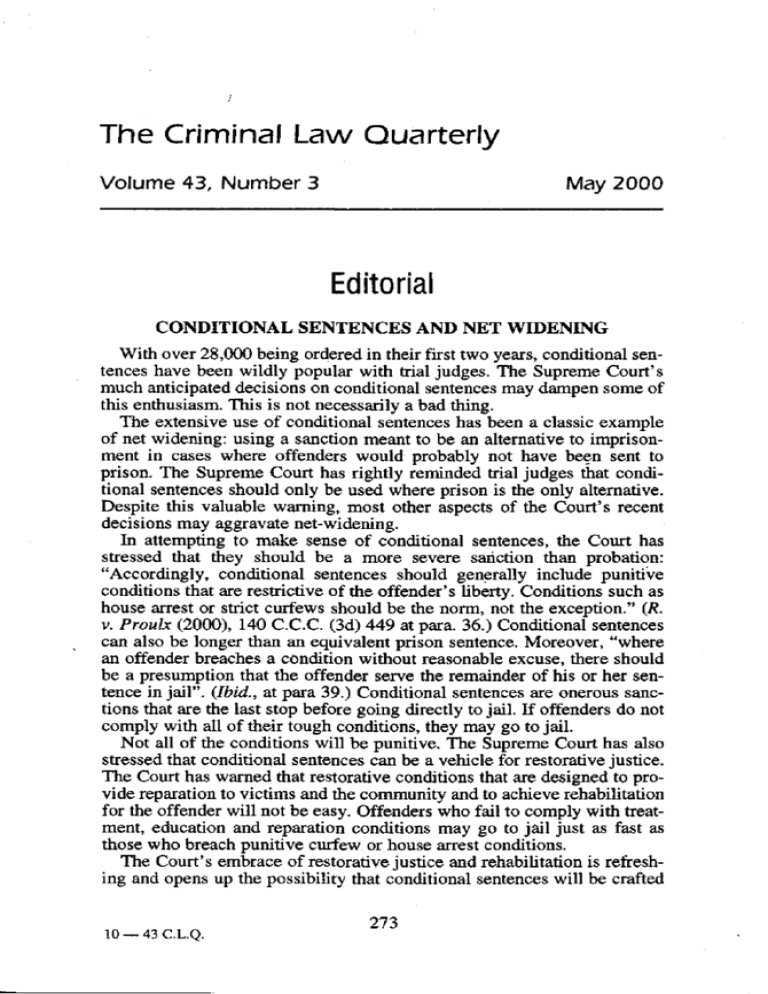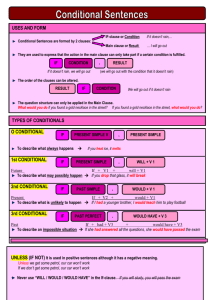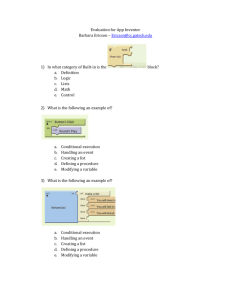Editorial
advertisement

The Criminal Law Quarterly Volume 43, Number 3 May 2000 Editorial CONDITIONAL SENTENCES AND NET WIDENING With over 28,000 being ordered in their first two years, conditional sentences have been wildly popular with trial judges. The Supreme Court's much anticipated decisions on conditional sentences may dampen some of this enthusiasm. This is not necessarily a bad thing. The extensive use of conditional sentences has been a classic example of net widening: using a sanction meant to be an alternative to imprisonment in cases where offenders would probably not have b""n sent to prison. The Supreme Court has rightly reminded trial judges that conditional sentences should only be used where prison is the only alternative. Despite this valuable warning, most other aspects of the Court's recent decisions may aggravate net-widening. In attempting to make sense of conditional sentences, the Court has stressed that they should be a more severe sariction than probation: "Accordingly, conditional sentences should generally include punitive conditions that are restrictive of the offender's liberty. Conditions such as house arrest or strict curfews should be the norm, not the exception." (R. v. Proulx (2000), 140 C.C.C. (3d) 449 at para. 36.) Conditional sentences can also be longer than an equivalent prison sentence. Moreover, "where an offender breaches a condition without reasonable excuse, there should be a presumption that the offender serve the remainder of his or her sentence in jail". (Ibid., at para 39.) Conditional sentences are onerous sanctions that are the last stop before going directly to jail. If offenders do not comply with all of their tough conditions, they may go to jail. Not all of the conditions wil1 be punitive. The Supreme Court has also stressed that conditional sentences can be a vehicle for restorative justice. The Court has warned that restorative conditions that are designed to provide reparation to victims and the community and to achieve rehabilitation for the offender wil1 not be easy. Offenders who fail to comply with treatment, education and reparation conditions may go to jail just as fast as those who breach punitive curfew or house arrest conditions. The Court's embrace of restorative justice and rehabilitation is refreshing and opens up the possibility that conditional sentences will be crafted 10 - 43 c.L.Q. 273 274 Criminal Law Quarterly [Vol. 43 in some serious cases as a genuine alternative to jail. The equation of restraint in the use of imprisonment with restorative justice may, however, result in net-widening. Trial judges may be tempted to impose conditional sentences with lengthy and onerous restorative conditions when less intrusive sanctions might suffice. Restorative justice has noble aspirations to respond to the needs of offenders, victims and communities, but there will inevitably be false starts and failures. When trial judges attempt to achieve restorative justice through the coercive tool of a conditional sentence, the consequence of failure may be jail. For example, offenders who "need" to attend intensive treatment or education programmes or to abstain from alcohol may fail to do so. They may then be breached and sent to jail perhaps for longer than if they had been imprisoned in the first place. One lesson of the 1960s was that the good intentions of rehabilitative interventions did not take away from their coercive impact. This insight should also be applied to restorative sentences. As the length and severity of punitive or restorative conditions attached to conditional sentences increase, it is only human that the likelihood of breach will also increase. Provinces that use electronic monitoring and have adequate parole resources may be quite adept at detecting breaches. As Carol Fleischhaker's article in this issue demonstrates, the breach provisions are severe. The state need only prove breach on a balance of probabilities, perhaps on the basis of hearsay evidence. if the offender is arrested for a breach, he or she faces a reverse onus on bail. Although the judge who finds a breach has a range of options, the Supreme Court has now created a presumption for the most severe option under s. 742.6(9): imprisonment for the duration of the conditional sentence. Trial judges may continue to be tempted to use conditional sentences instead of probation for a variety of reasons including the imposition of treatment orders and longer periods of community service as well as desires to achieve restorative justice and rehabilitation. if they continue to impose conditional sentences on offenders who would not otherwise have been imprisoned, the consequences of the Supreme Court's recent decisions are quite frightening. Offenders who would not normally have been in jail will be exposed to conditional sentences with punitive conditions such as house arrest and strict curfews and restorative conditions such as orders for treatment, education and reparation. The conditional sentence may be longer than the short prison sentence that such offenders would, at most, have received. When offenders breach the conditions, the Court has created a presumption that they will serve the rest of the conditional sentence in jail. Conditional sentences, as conceived by the Supreme Court, can only be justified if they are a true alternative to jail. Unfortunately, there are reasons to be pessimistic about whether they will be used in that fashion. The Court's six recent cases suggest that conditional sentences will often not be an appropriate response to serious crimes. Of the six cases, the court 2000] Editorial 275 only clearly endorsed conditional sentences for breach of trust and even then was divided 5:3 (R. v. Bunn (2000), 140 C.c.c. (3d) 505). The Court did not rule out conditional sentences in serious cases and rightly rejected Crown arguments that conditional sentences were an inherently disproportionate response to serious crimes. Proportionality is more than denunciation of the crime committed and conditional sentences can be crafted to achieve proportionality. Nevertheless, the Court did indicate that the need to deter and denounce serious crimes such as sexual assault and dangerous driving causing death will frequently require the use of imprisonment. if serious crimes are often excluded from conditional sentences, this significantlY'reduces the opportunities to use conditional sentences as genuine alternatives to imprisonment. Conditional sentences may continue to be used in less serious cases, increasing the danger of net widening. As a result of the court's recent decisions, trial judges ordering conditional sentences will be encouraged to impose onerous punitive and restorative conditions for a longer period of time than if they had sent the offender directly to jail. Once a breach is established (and this may not be difficult to do), the court has created a new presumption that offenders should serve the rest of the conditional sentence in jail. Contrary to the best intentions of Parliament and the Court, conditional sentences may continue to widen the net. When they are breached, they may even increase the use of imprisonment. K.R.






